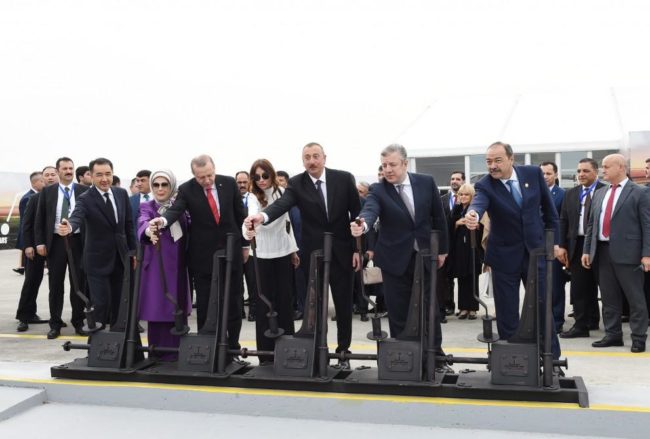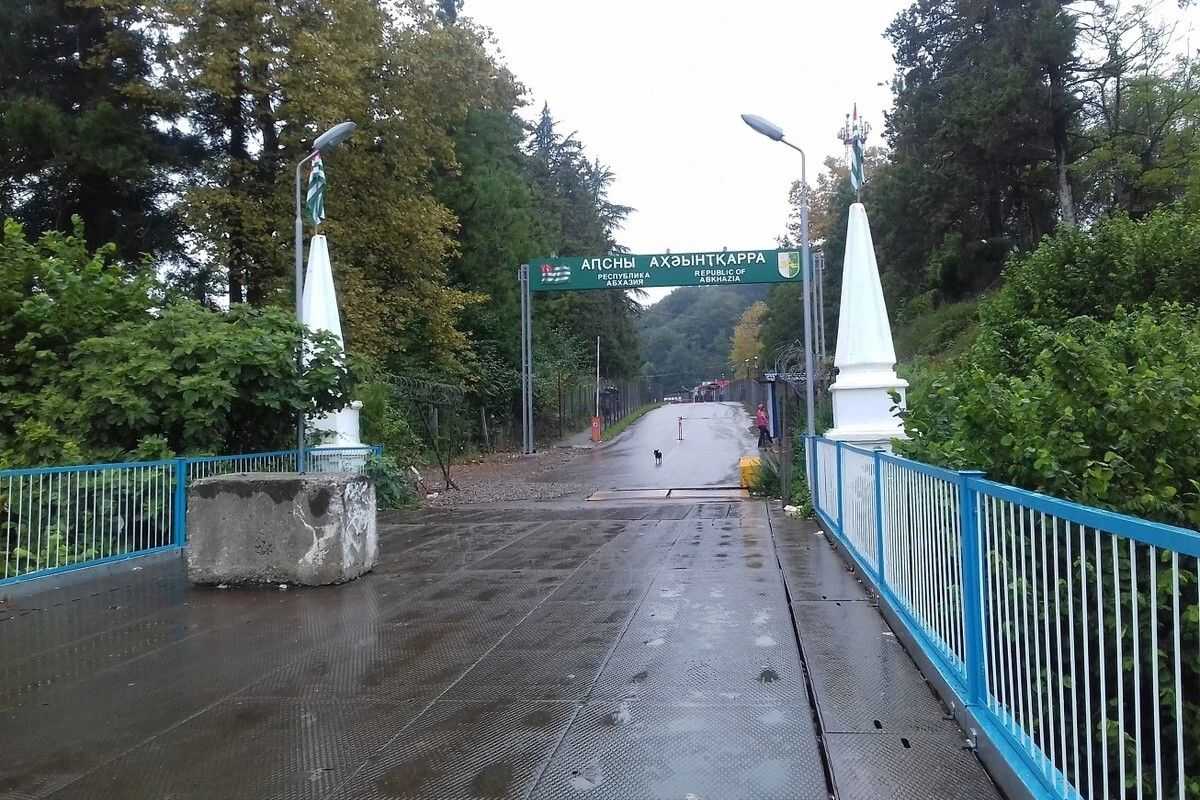

 The shortest rail connection between Europe and Asia has now began operating. But questions remain over whether the project will bring together East and West, be competitive, and bring economic success?
The shortest rail connection between Europe and Asia has now began operating. But questions remain over whether the project will bring together East and West, be competitive, and bring economic success?
[Read in Azerbaijani — Azərbaycan dilində oxuyun]
The Baku–Tbilisi–Kars railway, commonly known as the Iron Silk Road, has finally been put into operation. The opening ceremony on 30 October in Baku was attended by the leaders of Azerbaijan, Turkey, Georgia, Kazakhstan, and Uzbekistan.
The railway opening, which has been announced and delayed several times over the years, has finally been realised. But this prolonged process has led many to question its profitability, its impact on the region, and its long-term viability.
Why was the project delayed?
The project was first discussed in 2005, and was approved in 2007, but a detailed plan was not drawn up at the time. This process became so protracted that many started to question whether it was really going to go ahead.
Azerbaijan, Georgia, and Turkey did not initially prepare any assessment about the commercial side of the railway, its impact on economic relations between Azerbaijan and Turkey, or what revenue it would bring to Georgia as a transit country.
During numerous presentations, the authorities emphasised its importance for China–Europe relations and its alignment with the Chinese Railway Silk Road Project, which aims to connect China with Europe via a transcontinental freight railway.
Even after the railway’s opening, neither Turkey nor Azerbaijan have so far presented any figures on what is being transported or in what volume in their joint meetings on the project. Even in Azerbaijan’s economic development plan, there are no clear-cut figures on the railway or the revenues it is expected to bring. A tariff policy between Azerbaijan and Georgia is also yet to be determined.
Economic and political expectations
The situation is in many ways quite different now than when the project was approved in 2007. Since then, the value of the manat has seen two big drops, and global oil prices have slumped. Additionally, after the change in power in Georgia in 2013, the billionaire Bidzina Ivanishvili-led government has been somewhat suspicious of the project, while Turkey has favoured smaller, local infrastructure projects.
Other economic realities have changed since 2007; the volume of cargo transported from Central Asia to Azerbaijan has decreased, while the China–Kazakhstan–Russia–Europe route, considered an alternative to Baku–Tbilisi–Kars, is already operating. In addition, no international investment institution has shown any interest in the project.
Governments in the region are paying a great deal of attention to Iran, with which Azerbaijan is considered part of China’s ‘One Belt, One Road’ development strategy launched in 2013 which aims to increase connectivity within Eurasia.
According to the BBC, unlike Baku–Tbilisi–Kars, China has invested $1.6 billion into a new electrified railroad connecting the city of Mashhad in northeast Iran with the capital Tehran.
In order to accommodate China’s interests in Iran, Azerbaijan has offered to support the ‘One Belt, One Road’ strategy with its own transport and transit capabilities. There are two important aspects of this strategy — the Silk Road Economic Belt, a shared common economic area for China, post-Soviet countries, and EU member states, and the Maritime Silk Road, for cooperation in seas and oceans. One of its main goals is to achieve the free and economical movement of goods from one end of the Eurasian continent to the other. Both of these initiatives include Iran.
After the project is completed, it will become possible to dispatch cargo from London to Beijing. Through the Aktau and Turkmenbashi ports in Kazakhstan and Turkmenistan, it will be possible to deliver cargo to China, India, Pakistan, and Afghanistan. Preliminary calculations by Azerbaijan’s Parliamentary Committee on Economic Policy, Industry, and Entrepreneurship, estimated the volume of trade between the three countries would reach $10 billion by the launch of the Baku–Tbilisi–Kars.
According to state-owned Azerbaijan Railways, in the initial years, they will earn a minimum of $50 million annually. Azerbaijan Railways’ 2011 revenue was ₼193 million ($113 million).
What about Russia?
The Russian factor has been presented as one of the main obstacles to the railway. The project bypasses both Russia and Armenia, its main ally in the South Caucasus, leaving both countries with no economic or strategic benefits.
At the same time, Russia is trying to push its own railway connecting it with Armenia via Abkhazia. Considering Abkhazia a Russian-occupied territory, Georgia remains sceptical of this, and has found political support for its position in Azerbaijan and Turkey, while Russia tries to emphasise the economic aspects of the project.
The Karabakh factor
The railway is a positive development in that it is yet another project connecting Azerbaijan with the West, and becoming an important point in the East–West corridor raises Azerbaijan’s political weight. For the South Caucasus, this further strengthens Azerbaijan’s potential for attracting and implementing international projects. The role of Georgia as a transit country increases its international credibility and consolidates political support from the West. With Azerbaijan being by far the biggest investor in Georgia’s economy, Georgia also benefits from the possibilities of a rich and reliable partner like Azerbaijan.
Baku–Tbilisi–Kars also forms a major part of Azerbaijan’s efforts to keep Armenia in an economic and political blockade, in an attempt to move its stance on the Nagorno-Karabakh conflict. The closed border between Turkey and Armenia and the absence of economic and political ties between them is a key factor for Azerbaijan.
But this has led to the United States and the European Union opposing the railway project and refusing to finance it, on the basis Armenia wasn’t involved. This has forced Azerbaijan to foot the bill — it has given Georgia $220 million annually for 25 years with an interest rate of just 1% per annum.
In order to bypass Armenia, Azerbaijan’s State Oil Fund has given low-interest loans to Georgia for construction of infrastructure between Kars and Akhalkalaki (in Samtskhe–Javakheti), a 26 kilometre section, as well as upgrading the 153 kilometre Akhalkalaki–Marabda (in Kvemo Kartli) railway line for about $775 million.
Current challenges
According to Azerbaijan’s State Oil Fund, the Azerbaijani government allocated over $640 million from the state budget from the beginning of the project till 30 September 2017.
This was also used to implement most of the construction work in Georgia. Currently, the biggest challenge is to involve international investors in the project.
Another issue is exchanging freight trains on the Georgian–Turkish border, as different railway track gauges are used in former Soviet Union and European countries. According to Azerbaijan Railways, a special station has been set up on the border to change the wheels on passenger trains. With the time-consuming process of transporting cargo through the Caspian Sea — a distance of 400 kilometres — the change of wheels delays the cargo even more.
The lack of consensus on tariffs is also a problem yet to be solved.








